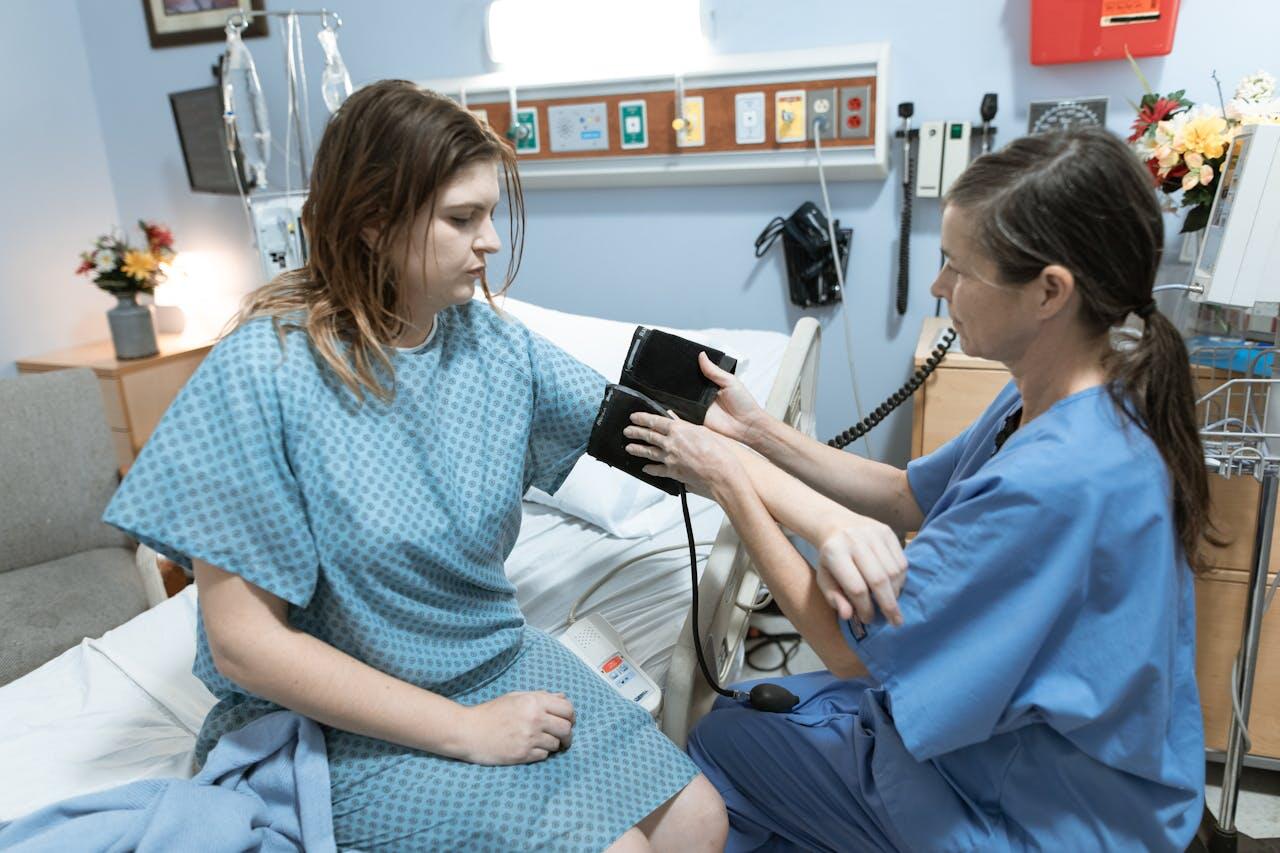Nursing is an art: and if it is to be made an art, it requires an exclusive devotion as hard a preparation as any painter’s or sculptor’s work
Florence Nightingale
Understanding the differences between nurse practitioners (NPs) and doctors is crucial in healthcare. Both play essential roles in the health care system, bringing unique skills and training to the table. By learning about their distinct roles, we can appreciate the various ways to receive care and recognize the importance of teamwork in healthcare.
In this article, we'll explore the key differences between NPs and doctors, such as their scope of practice and academic pathways. Let's get started.

🏥 Comparison At A Glance
Doctors and nurse practitioners both play significant roles in Canada’s healthcare system. They often work together as a team to provide the best possible primary care, always keeping the patients’ best interests in mind.

Nurse practitioners and medical doctors share more similarities than we expect in terms of their job roles and job settings:
Major Job Roles
Job Training and Settings
However, while both nurse practitioners and medical doctors play vital roles in patient care, there are several important areas in which their roles, training, responsibilities, and scopes of practice differ. We will delve into each of these distinctions in detail in the sections that follow to provide a clearer understanding of how these two professions compare.
Example: Types of medical procedures and prescriptions
Example: With/without supervision
Example: Specialization of patients
📋 What is A Nurse Practitioner?
Nurse practitioners (NP) are advanced practice registered nurses with graduate-level education (Master's or higher) who provide a range of healthcare services, including diagnosing and treating illnesses, prescribing medications, and ordering diagnostic tests.
Due to their expertise and experience, they can work in different health settings which cater to patients of different age groups and treatment needs. These include nursing homes, health-care centres, community and outpatient clinics, emergency rooms, NP-led clinics and many more.
Additionally, NPs have a focus on preventative care and health promotion, and may spend more time with patients compared to doctors. Nurse practitioners are also called upon to take many different roles, such as conducting research or taking on administrative tasks or teaching.
Job Approach
In Canada, there are three common NPs streams based on their population care focus, task scope, and work settings. Other streams include mental health and neonatal care.
Primary Care Nurse Practitioner
- Population focus: All ages
- Treating scope: Broad and generalist conditions
- Work setting: NP-led Clinics
Adult Care Nurse Practitioner
- Population focus: Aged 14 and above
- Treating scope: Acute and critical health conditions
- Work setting: Hospitals
Pediatric
Nurse Practitioner
- Population focus: Newborn to 18 years old
- Treating scope: Complex pediatric conditions
- Work setting: Children's hospital, emergency rooms
💊 What is a Doctor?
Doctors, also known as physicians, are healthcare professionals who diagnose and treat diseases, manage chronic conditions, and provide preventive care.
Becoming a doctor in Canada involves rigorous education and training programs that are designed to ensure high standards of medical care through medical school and residency programs. Many doctors also pursue further specialization such as such as cardiology, neurology, or paediatrics, through fellowship programs.

In general, doctors have a comprehensive approach to patient care, emphasizing both treatment and prevention. They often work as part of a healthcare team, collaborating with other medical professionals to provide holistic care. Here are some tasks a doctor might do:
- Take detailed medical histories and document symptoms
- Conduct thorough physical examinations
- Order and interpret diagnostic tests, such as blood work, MRIs, X-rays and nuclear medicine imaging
- Diagnose complex illnesses and injuries
- Develop and implement treatment plans, including surgeries and other procedures
- Prescribe controlled medications and therapies
- Provide advice on preventive healthcare and healthy lifestyle choices
- Refer patients to specialists when necessary

👩⚕️ How Does a Nurse Practitioner Differ from a Doctor?
At first glance, nurse practitioners (NPs) and doctors may seem to do many of the same things, especially in primary care. While there is some overlap, there are also important differences. NPs have certain limits on their scope of practice (what they can do), depending on the patient's situation and the province in which they work.
All provinces and territories in Canada, except Quebec, grant Nurse Practitioners (NPs) full or near-full autonomy. Some nurse practitioners can even run their own clinics in several provinces. However, in Quebec, NPs must work under a collaborative agreement with a physician, which limits their autonomy compared to other provinces.
Let’s take a look at how NPs and doctors compare in terms of the following key differences:
| Criteria | Nurse Practitioner (NP) | Medical Doctor (MD) |
|---|---|---|
| Scope of Diagnosis and Treatment | Can assess, diagnose, and treat common and chronic conditions in patients | Can diagnose and treat all patients including those with complex and rare cases |
| Medical Procedures | Can perform minor procedures like sutures and biopsies | Can perform both major and minor procedures, and of course surgeries |
| Medication Prescription | Can prescribe medications with limited authority on controlled substances | Can prescribe all medications without restriction |
| Diagnostic Imaging Authority | Can order basic imaging types like X-Ray, ultrasounds MRI and CT except nuclear medcine imaging | Can order all types of imaging including nuclear medicine imaging |
| Autonomy | Mostly indepedent in primary care, and autonomy level varies according to province | Full autonomy |
| Field of Specialization | Focused to limited streams: Primary care, Adult Care, Pediatrics, Mental Health, and Neonatal | Wide range of specializations, more than 40 specializations |
🩺 Will Nurse Practitioner Training be Easy Compared to a Physician?
Nurse practitioner training, much like physician training, is rigorous and challenging. Both career paths require significant time in practical settings, working alongside experienced healthcare professionals. However, there are differences in the length and nature of the training.

To become a nurse practitioner, you must first be a licensed registered nurse (RN). This journey starts with a 4-year university program to become an RN.
After gaining at least 2 years of clinical experience as a registered nurse, you can then pursue advanced training to become an NP. The education pathway programs for nurse practitioners in Canada typically fall into the following streams:
- Master of Nursing-Primary Health Care Nurse Practitioner (MN-PHCNP)
📌 This is the most common pathway after you have completed your 2-year clinical practice as a registered nurse. The syllabus of this program offers a generalist route, which focuses on primary care for patients across all ages.
- Post-Master’s Certificate (PHCNP)
📌 This is the pathway taken by registered nurses who already have a Master's degree in Nursing and want to obtain the license to become a nurse practitioner.
- Specialized NP Stream Program
📌 This is the pathway taken by registered nurses who are sure of their specialization direction, either in pediatrics, mental health, neonatal care or adult care. For instance, McGill University is well known for its extensive NP specialization programs.
On the other hand, training to become a doctor is extensive, often taking between 7-15 years. While physicians undergo a longer training period, both paths demand dedication and hard work. Financially, medical school and residency typically involve higher tuition and living costs over a more extended period.
Step 1
Get an undergraduate degree (Important subjects include Biology, Chemistry, Physics, Mathematics)
Step 2
Apply for medical school and sit for the Medical College Admission Test
Step 3
Graduation from medical school and residency training
Step 4
After residency training, you are now a licensed physician. Fellowship is optional for further specialization
Your choice between becoming a physician or a nurse practitioner will depend on your personal goals, the amount of time and money you are willing to invest in your education, and your academic and career preferences. Both paths offer rewarding careers in healthcare, each with its own unique challenges and opportunities.
If you are interested in rewarding, steady work that is always in demand, you might want to consider starting a career in nursing. Nurses are in demand not only in Canada but around the world.
💉 What is the Program Like to Become a Nurse Practitioner?
Becoming a nurse practitioner is no easy task. Graduate school requires a lot of academic rigour, and you must be prepared to assume a great position of responsibility once you start work as an NP.
Source: Statistica and Canadian Institute for Health Information
This figure above signifies the exclusivity of becoming a nurse practitioner in Canada. The rewards of enhancing your expertise as a health professional are high - you will be among the most essential, important and indispensable health professionals. For instance, some of the course modules that you might come across while studying the PHCNP program in Ontario universities like York University and Queen's University include:
Finding the perfect balance between knowledge and experience is key. You certainly want to be able to understand the hands-on, actual work of nursing prior to acquiring the next level of education. Be sure to get your experience in the area where you want to build your expertise.
For example, if you want to work in pediatrics, you may want to get experience in an institution like a children's hospital. If you want to work in an urgent care setting, do your best to immerse yourself in an emergency care environment.
You might have come across physician assistants in the healthcare system too, and get confused between these two. One key difference is physician assistant must always work under the supervision of a licensed physician, regardless of where they are.
📝 What is the Best Place to Find a Nursing Tutor?
Finding a nursing tutor is easy using Superprof Canada's site. Superprof connects students with tutors who have expertise in a vast array of disciplines, including nursing, mathematics, biology, chemistry, and English.
Use the site to browse through hundreds of Canadian tutors and read through profiles to see if their educational background and training align with your learning goals. Whether you are currently a high school student or a nursing student who's planning to take a graduate program, you'll be in good hands through one-to-one personalized tutoring.

You can even message tutors directly through the site to see if they will be a good fit. You can work with a tutor for as little or as long as it makes sense for you. The best part of learning with Superprof? Most Superprof tutors offer their first lesson for free!
What are you waiting for? Check out Superprof today!
Summarize with AI:
















A nurse practitioner can diagnose treat order medication and diagnostic tests and refer to specialists the same as a MD. There is very little that a NP cannot do in primary care. Please get your facts straight.
Hi Brenda, Thanks for your response. We are always looking to maintain the quality of content on our blog.
Hi the scope of practice (what NPs do in Canada) in this article is incorrect. NPs have an important role to play in healthcare, and it’s important that the general public correctly understands thunder scope of practice.
In Canada, NPs work independently or with other health care professionals in family health teams , in NP led clinics, or as private contractors. There are three classifications of NPs; primary care, adult, and paediatric degrees. Adult and paediatric NPs typically work in hospitals, while primary care NPs work in clinics. Across Canada: NPs can diagnose, communicate diagnoses, prescribe medications and therapies, order tests, and make referrals. They can suture and set bones. The main difference between NPs and physicians is that NPs cannot deliver a baby, or order nuclear imaging tests. Also to prescribe narcotics, NPs first have to complete additional training with their college). NPs are a regulated profession, which like physicists, means they report to regulatory body which promotes the best interests of the general public. To be a NP you typically need: an undergraduate nursing degree, a masters degree in science or nursing and 3640 (2 years) current nursing experience.
Thanks!
Hi Grace, thanks for your feedback! We will keep this in mind for the next update of this particular article.